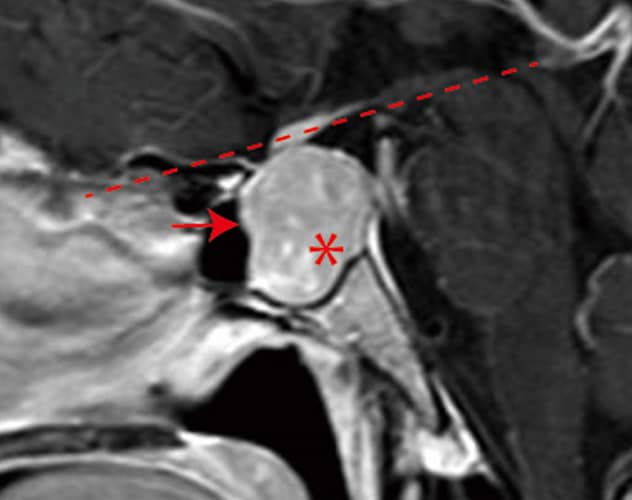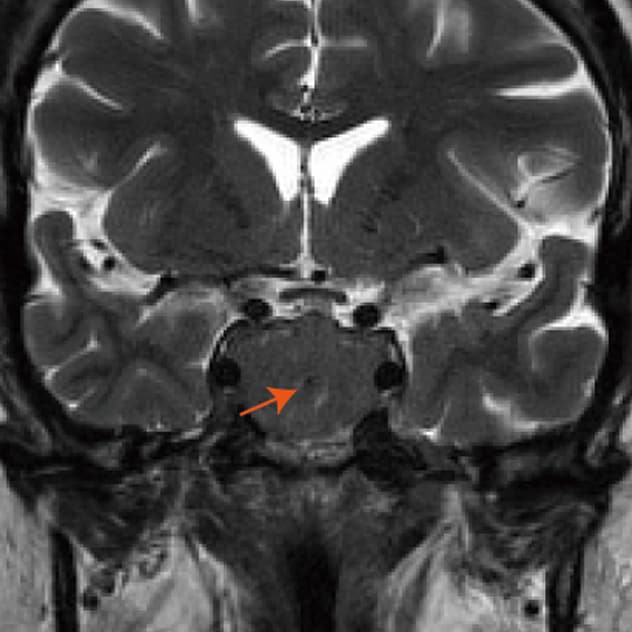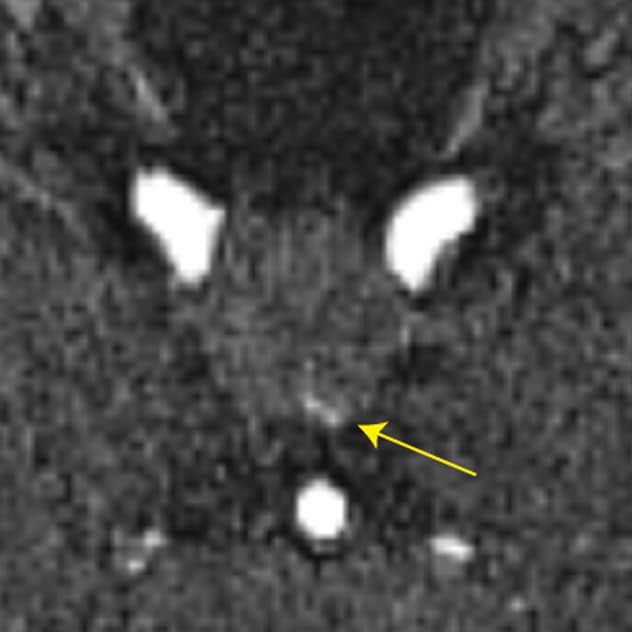April 15, 2021
Spindle cell oncocytoma (SCO) of the pituitary gland is a rare posterior pituitary neoplasm. Although classified as a grade 1 tumor, it has clinically aggressive features, including hypervascularity and tenacious recurrence. An optimal treatment strategy has yet to be elucidated.
Señales radiográficas

Señales radiográficas
Las imágenes preoperatorias de un paciente con oncocitoma de células fusiformes muestran características peculiares del cáncer. La glándula pituitaria está desplazada en la parte anterior (flecha). Hay numerosos realces de contraste curvilíneo dentro del tumor, que sugieren vasos intratumorales (asterisco). El tallo hipofisario está desplazado más horizontalmente que lo usual (línea de rayas).
Hipointensidad con manchas dentro del tumor

Hipointensidad con manchas dentro del tumor
La imagen potenciada en T2 muestra una hipointensidad con manchas dentro del tumor (flecha).
Señal de flujo intratumoral

Señal de flujo intratumoral
La señal de flujo intratumoral (flecha) se puede ver en la angiografía por resonancia magnética.
Based on a review of 85 cases, Mayo Clinic neurosurgical researchers have identified clinical, radiographic and pathological features of SCO. The study, published in World Neurosurgery in 2021, also describes possible treatment strategies.
SCO is challenging to diagnose preoperatively, due to its radiographic resemblance to other pituitary tumors. The Mayo Clinic study found that severe hyponatremia — with its associated fatigue, nausea and emesis — may be present in individuals with SCO. A highly vascular, posteriorly placed tumor that displaces the pituitary gland or stalk antero-superiorly might also indicate SCO.
Surgery is complicated by tumor location and by the tumor's hypervascular, fibrous and adhesive nature. SCO is frequently located behind the anterior lobe. Cavernous sinus extension is common. The researchers found many cases in which heavy intraoperative bleeding resulted in incomplete resection or massive blood loss or both.
Among the SCO cases studied, gross total resection (GTR) was achieved in only 24% of patients. The tumor control rate five years after treatment was 75% when GTR was achieved, compared with 24% after non-GTR.
The researchers note that radiotherapy might help decrease tumor progression: Patients who had radiotherapy following non-GTR had a tumor control rate of 76% after five years. However, if GTR isn't achieved and radiotherapy isn't performed, 50% of tumors show significant progression and require further treatment within about two years. Multiple recurrences happen in 20% of these patients, and even distant metastasis is possible.
The researchers further note that long-term follow-up is needed for all patients and that the rate of progression raises questions about the SCO's classification as a grade 1 tumor.
For more information
Hasegawa H, et al. A comprehensive study on spindle cell oncocytoma of the pituitary gland: Series of 6 cases and meta-analysis of 85 cases. World Neurosurgery. In press.